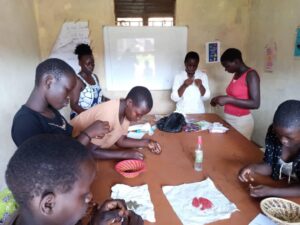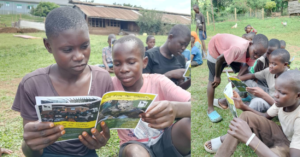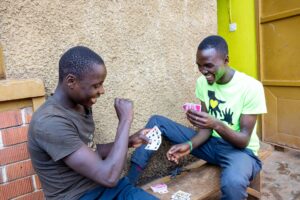Tabitha* dropped out of school in primary six at age 13, just before finishing up her primary education level. She wandered with a group of fellow teens and made easy money through prostitution and trading in intoxicating drugs. She gave up on prostitution because she felt she was still too young for this but the group’s masterminds decided that she would be good for exchanging drugs for money instead. Her target market was in teenage males who kept on buying marijuana from her with some other common drugs that are used in many slum settlements around Jinja.
Tabitha would go home late in the evening and sometimes late in the night from her work. At a certain point her mother would decide to lock her out of the house to intimidate her never to stay out late but this didn’t work: Tabitha loved the money and the benefits that came with her lifestyle too much. Her major concern was having to survive on an empty stomach when her mum was away from home most of the day looking for work. She could sometimes come in late without the food and this would mean going to bed hungry. But now she could afford to feed herself, and never had to worry about going hungry.
Girls Drop In centre
 At this time, Tabitha and the friends started attending the Girls Drop In Centre run by S.A.L.V.E. International situated within their area. She would come in with a group of girls who were excited to learn new things here. They were very active during class sessions but it took them a long time to open up about their personal life. This cycle went on for many months, but was broken the week she got beaten up by a gang of boys whom she had confronted for failing to pay for their drugs. The S.A.L.V.E. staff at the center had not seen Tabitha in her group for a long time now and became inquisitive about her. It was their eldest member in the group that informed about how she had been attacked. The staff asked these girls to encourage Tabitha to return to the Girls Drop In Centre and good enough she came by.
At this time, Tabitha and the friends started attending the Girls Drop In Centre run by S.A.L.V.E. International situated within their area. She would come in with a group of girls who were excited to learn new things here. They were very active during class sessions but it took them a long time to open up about their personal life. This cycle went on for many months, but was broken the week she got beaten up by a gang of boys whom she had confronted for failing to pay for their drugs. The S.A.L.V.E. staff at the center had not seen Tabitha in her group for a long time now and became inquisitive about her. It was their eldest member in the group that informed about how she had been attacked. The staff asked these girls to encourage Tabitha to return to the Girls Drop In Centre and good enough she came by.
The S.A.L.V.E. team members found out that she was living dangerously and decided urgent action needed to be taken. She was hesitant at first because she was unwilling to disclose her mode of earning to her mother. But eventually, she agreed to have one of our social workers accompany her to her home and share everything with the mother and try to reconcile the family. This was a success and after some time, Tabitha’s mother was referred to our Single Mother’s Business program and received the necessary help to start up and small stall for selling simple merchandise. With continued follow-ups, Tabitha began to give up going to the streets and decided to help out her mother with her new business. The mother also gave up on spending much time away from home and took much better care of the home and the business.
Transformation
With much thought, Tabitha decided she would like to take on a course in hair dressing and she plans to join a vocational training school soon with S.A.L.V.E.’s help. She dreams of starting up a salon and to start earning safely.
With such successes, we remain committed in transforming lives from dangerous modes of living to sustainable ones. At S.A.L.V.E. we draw great inspiration from different children who have been found in dire situations and look to have reached a “point of no return”, then transformed into responsible individuals ready to give up bad habits, gang life and return to education. One gets overtaken by awe at such transformation and keeps on looking forward to finding another success story.
*names of children are change in line with our Child Protection Policy





0 Comments